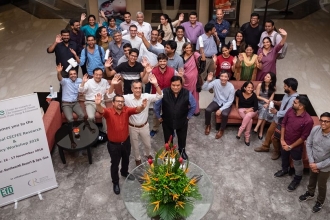
4th Annual CECFEE Research and Policy Workshop
The Center for research on the Economics of Climate, Food, Energy and Environment (CECFEE) of the Indian Statistical Institute, New Delhi, will conduct the 4th Annual CECFEE Research and Policy…


The Center for research on the Economics of Climate, Food, Energy and Environment (CECFEE) of the Indian Statistical Institute, New Delhi, will conduct the 4th Annual CECFEE Research and Policy…

A workshop was organized by the Centre along with the Environment for Development Initiative (EFD) of the University of Gothenburg on October 15th and 16th at Ranthambhore. There were presentations…

AGENDA Monday, November 2, 2015 Morning Introduction and Welcome – E. Somanathan About EfD – Gunnar Kohlin, University of Gothenburg Credit, LPG Stove Adoption and Charcoal Consumption: Evidence from…
The book discusses the foundations of economics development and institutions. The chapters touch on several issues such as :
1) Institutions,Clientalism and Inequality
2) Institutions and Growth
3) Trade, Aid and Migration
4)Families,Gender and Culture
5) Sectoral Approaches
EfD India contribtuion : Book Chapters by Rohini Somanathan (Part 1 chapter 4) and E. Somanathan (Part 5, Chapter 20)
The employment structure of India’s organised manufacturing sector has undergone substantial changes over the last decade with a steep rise in the use of contract workers in place of directly hired workers. Much of the existing literature has attributed the widespread use of contract labour to India’s rigid employment protection legislation.
Introduction : Concern for health inequalities is an important driver of health policy in India; however, much of the empirical evidence regarding health inequalities in the country is piecemeal focusing only on specific diseases or on access to particular treatments. This study estimates inequalities in health across the whole life course for the entire Indian population.
Inaccurate definitions of urban areas in developing countries could have detrimental consequences for public service provision and construction of development indicators. We explore the suitability of the officially used administrative definition of urban and rural in India through a study of the Mahatma Gandhi National Rural Employment Guarantee Scheme (NREGS), a demand-driven scheme targeted to rural areas. Applying three alternative definitions we find that India is more urban than recognised by the administrative definition.
In February, 2020, another policy tour was conducted in Mukono district where the EfD-Mak researchers interacted with local government officials on issues of governance and Natural resources. Over 80…
In January, 2020, Environmentalist and economists from EfD- Mak Centre set out to Wakiso district headquarters to discuss with councillors how to sustainably use the environment while upholding the…
In November 7, 2019 the centre hosted its first policy dialogue on Governance and Natural Resources at Makerere University.The objective was to share research findings the university had come up with…